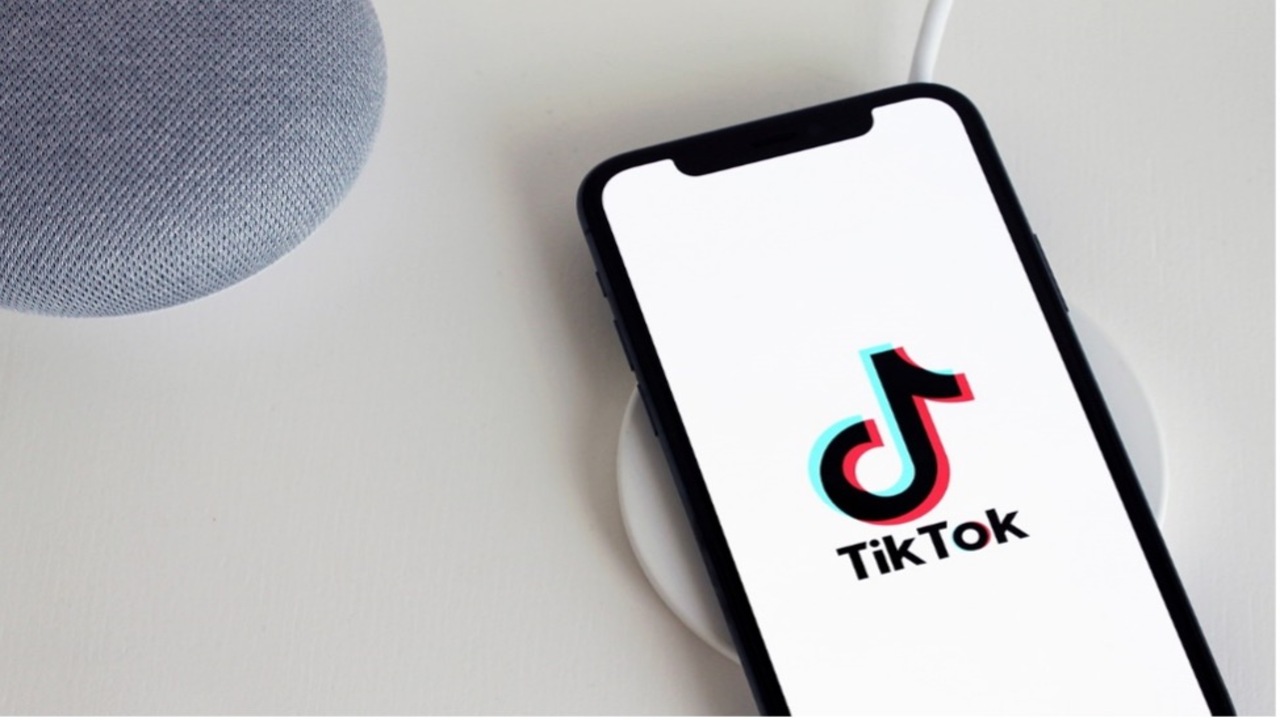
Related Content

ADL Debunk: Myths and False Narratives About the Israel-Hamas War
On March 13, 2024, the U.S. House of Representatives passed a bill that could potentially lead to a nationwide ban of the popular social media platform TikTok.
According to the bill, the issue stems from TikTok being owned by a “foreign adversary,” which poses a national security threat. TikTok’s China-owned parent company ByteDance would be required to find another buyer within six months to avoid the app being pulled from app stores in the US. While the bill has not yet made its way through the Senate, President Biden said that he intends to sign it if it lands on his desk.
Soon after the news broke about the House passage, influencers and extremists from across the political spectrum began framing the bill as an outright ban and speculating that the bill is a product of Jewish or Zionist influence, calling it an effort to infringe on free speech by limiting the reach of pro-Palestinian content.
Conspiratorial claims about Jewish influence in the media are nothing new, dating back to the Protocols of the Learned Elders of Zion, one of the most notorious and egregious antisemitic texts of the early 20th century. Allegations of Zionist media control are also widespread on both the far-right and the far-left, on social media and at demonstrations—most recently, at protests against the Israel-Hamas war. In the wake of the TikTok bill, these narratives have resurfaced to focus on three targets: Jews, Israel and Zionist organizations.
Claims targeting Jews
Antisemites and extremists are claiming that the TikTok bill is further evidence of powerful Jews silencing dissenting voices, invoking a classic trope about Jewish control.
On Gab, antisemitic influencer Lucas Gage—who has recently capitalized on the Israel-Hamas war to spread conspiracy theories about Jews and Zionism—argued that “Jews are getting desperate,” and that their “open war on Tik Tok is only increasing awareness of their power.”
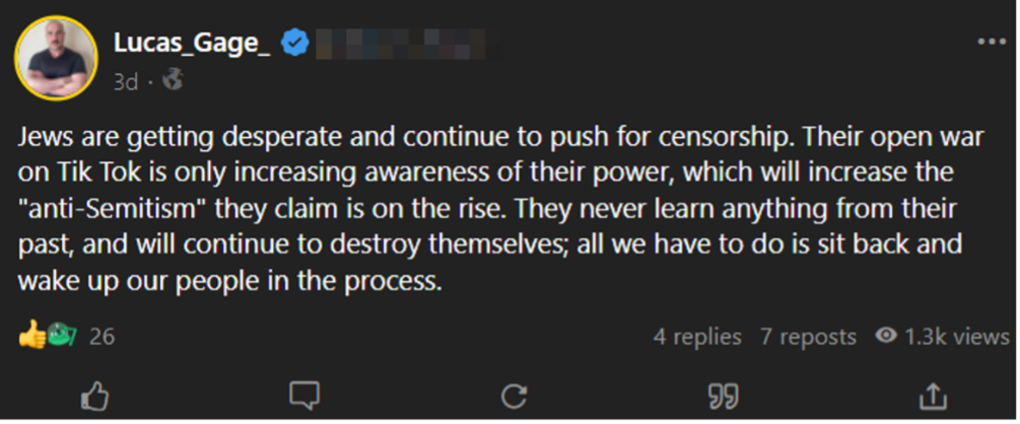
Lucas Gage posting conspiracy theory about “Jewish power.” Source: Gab
On X (formerly Twitter), antisemitic influencer Vincent James claimed that “The Jewish lobby” wants to oversee TikTok to “have complete control over narratives and information.”
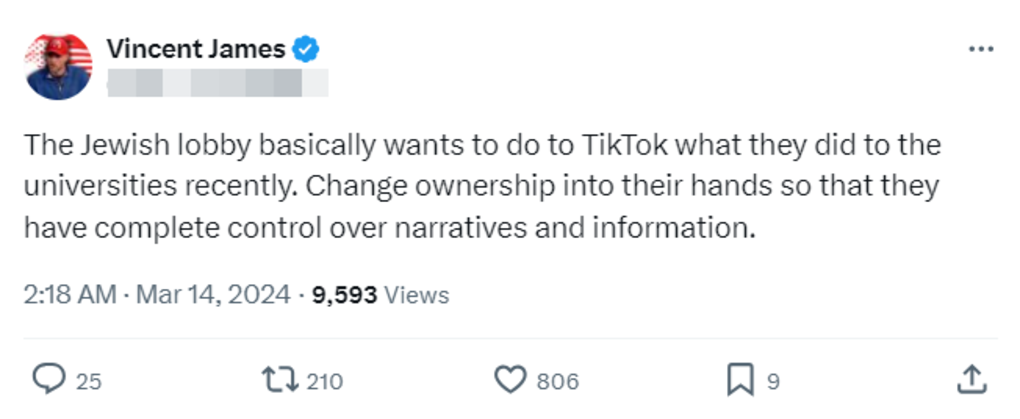
Vincent James accuses “Jewish lobby” of trying to control TikTok. Source: X
Claims targeting Israel
A popular claim from both the left and right is that Israel is exercising its allegedly disproportionate power by trying to ban TikTok and limiting the proliferation of pro-Palestine content.
Influencer and streamer Haz Al-Din, also known as “Infrared,” claimed on X that banning TikTok is not about China, but rather about giving “control to Israel in the interest of ‘the Zionist lobby.’”
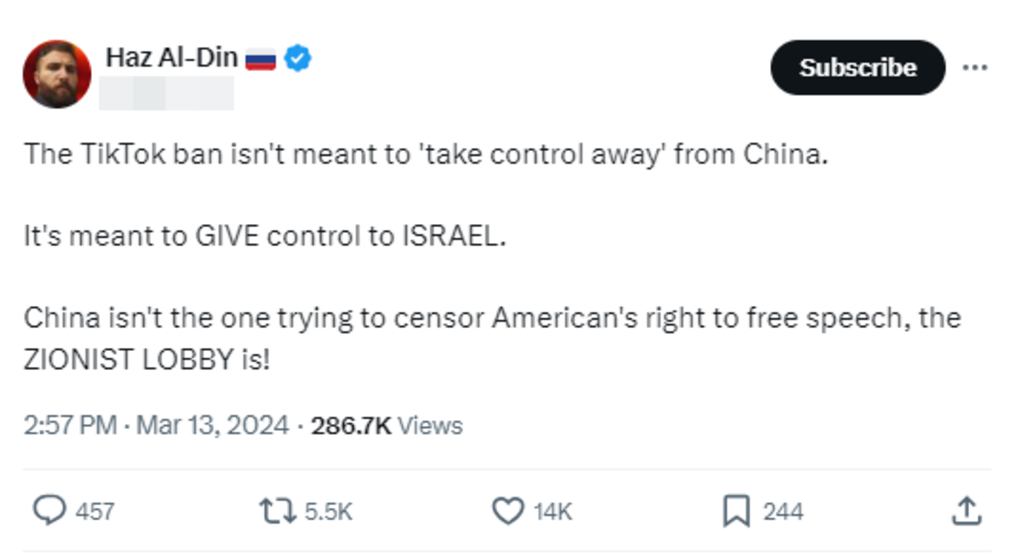
Haz Al-Din, a.k.a. Infrared, blames “Zionist lobby.” Source: X
Others have alleged that the American Israel Public Affairs Committee (AIPAC) is also responsible for the proposed ban. This narrative surfaced after some users cited OpenSecrets data that listed AIPAC donations to Rep. Mike Gallagher (R-WI), who spearheaded the bill. A popular conspiracy theorist on TikTok used this claim to suggest that Israel and Mossad are influencing the government’s decisions about TikTok, highlighting that the bill was introduced by a man whose “top contributions are coming from Zionists."
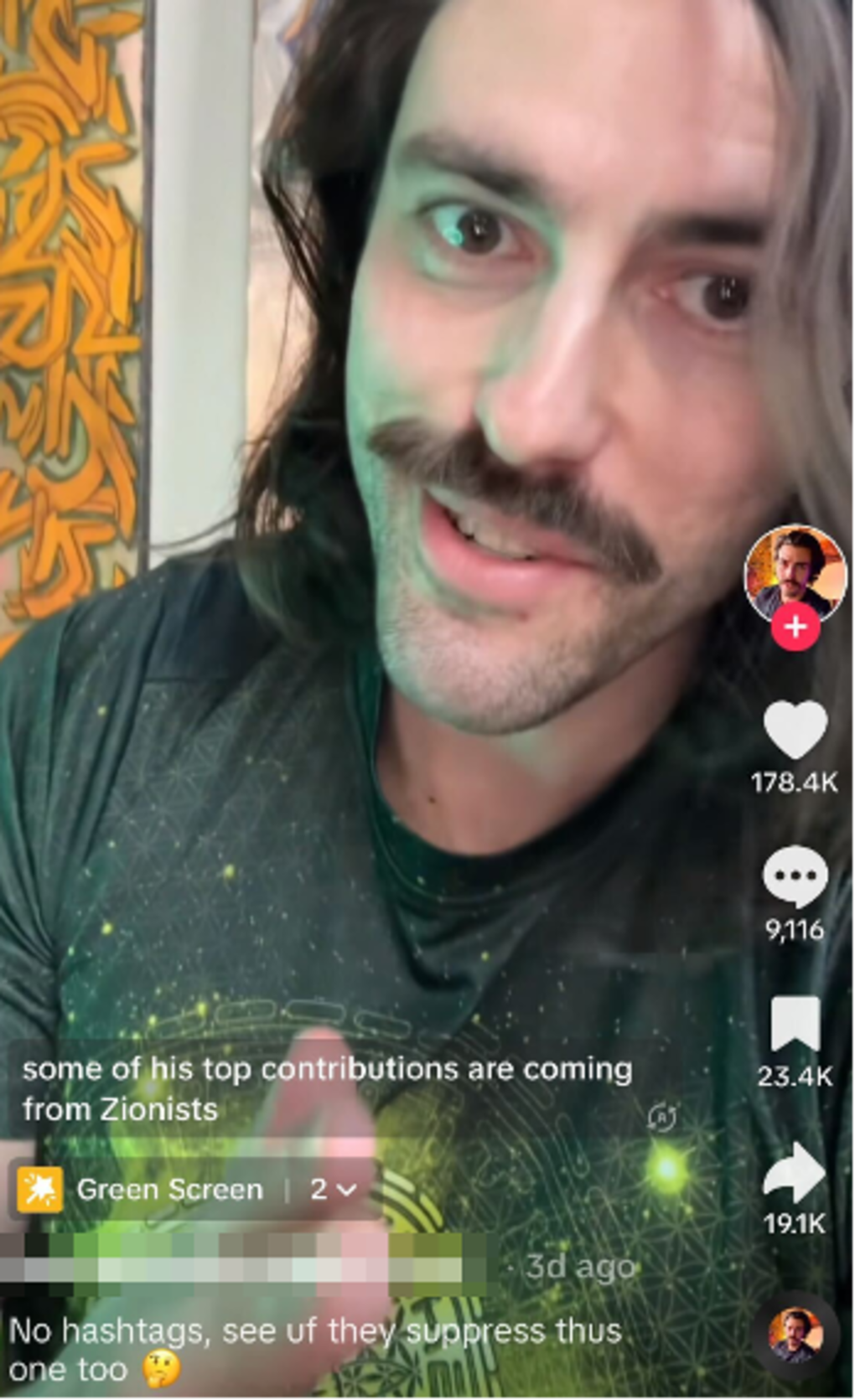
Influencer blames AIPAC, Mossad and others for TikTok bill. Source: TikTok
There is no evidence that AIPAC was involved with the creation of the bill itself. Also, AIPAC’s recent congressional summit on Capitol Hill discussed a range of lobbying efforts—none of which had to do with the TikTok bill. At the time of this writing, AIPAC has not yet commented publicly on the potential TikTok ban.
Claims targeting Zionist organizations
Antisemites and anti-Zionist influencers have cited organizations who call out TikTok for antisemitism on its platform as “evidence” that Zionist organizations control the narrative about the Israel/Palestine conflict on social media. This includes the Jewish Federations of North America, who publicly lauded the passage of the recent TikTok bill.
ADL (the Anti-Defamation League) has condemned antisemitic and anti-Zionist content on TikTok in the past. Promoters have falsely claimed that this public criticism, including statements from ADL CEO Jonathan Greenblatt, confirms that the organization is complicit in trying to get the platform banned.
On his show, antisemitic conspiracy theorist Stew Peters used the claim to support a bigoted, nonsensical rant about Jewish control, arguing that “Zionist shakedown crews like the ADL” are promoting legislation against TikTok because the platform “allows its users to question Israel.”
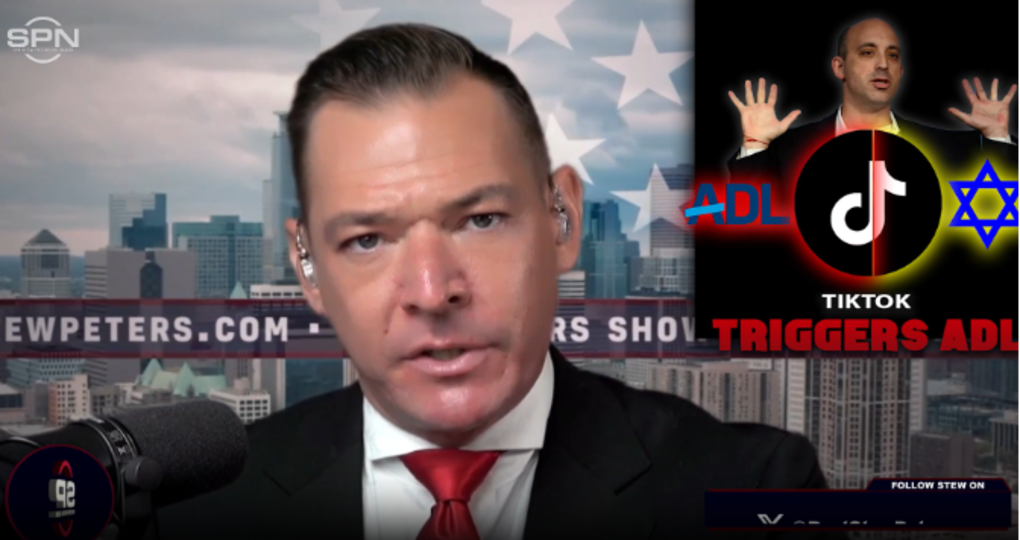
Stew Peters rants about “Zionist shakedown crews” on his show. Source: Rumble
Others have cited what they call “leaked audio” of Greenblatt, who was noting the proliferation of anti-Zionist rhetoric among younger generations on platforms like TikTok. In fact, Greenblatt made those remarks during a public zoom call that was later posted online by the Tehran Times, an Iranian regime mouthpiece, which mischaracterized the remarks as private and “leaked.”
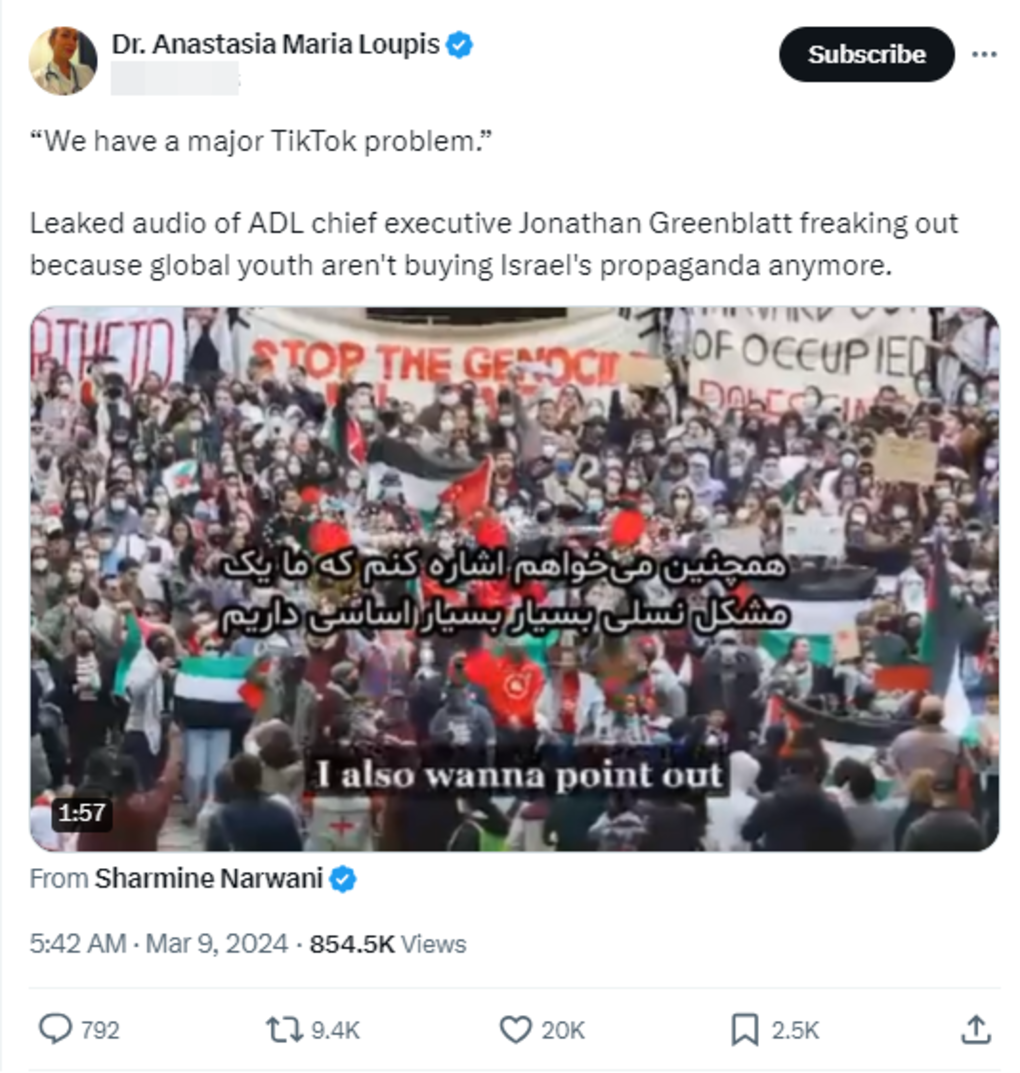
Dr. Anastasia Maria Loupis promotes narrative about Israeli propaganda. Source: X
Both far-left and far-right influencers have targeted Greenblatt and ADL in the process, including on Telegram channels affiliated with the antisemitic hate network, the Goyim Defense League (GDL).
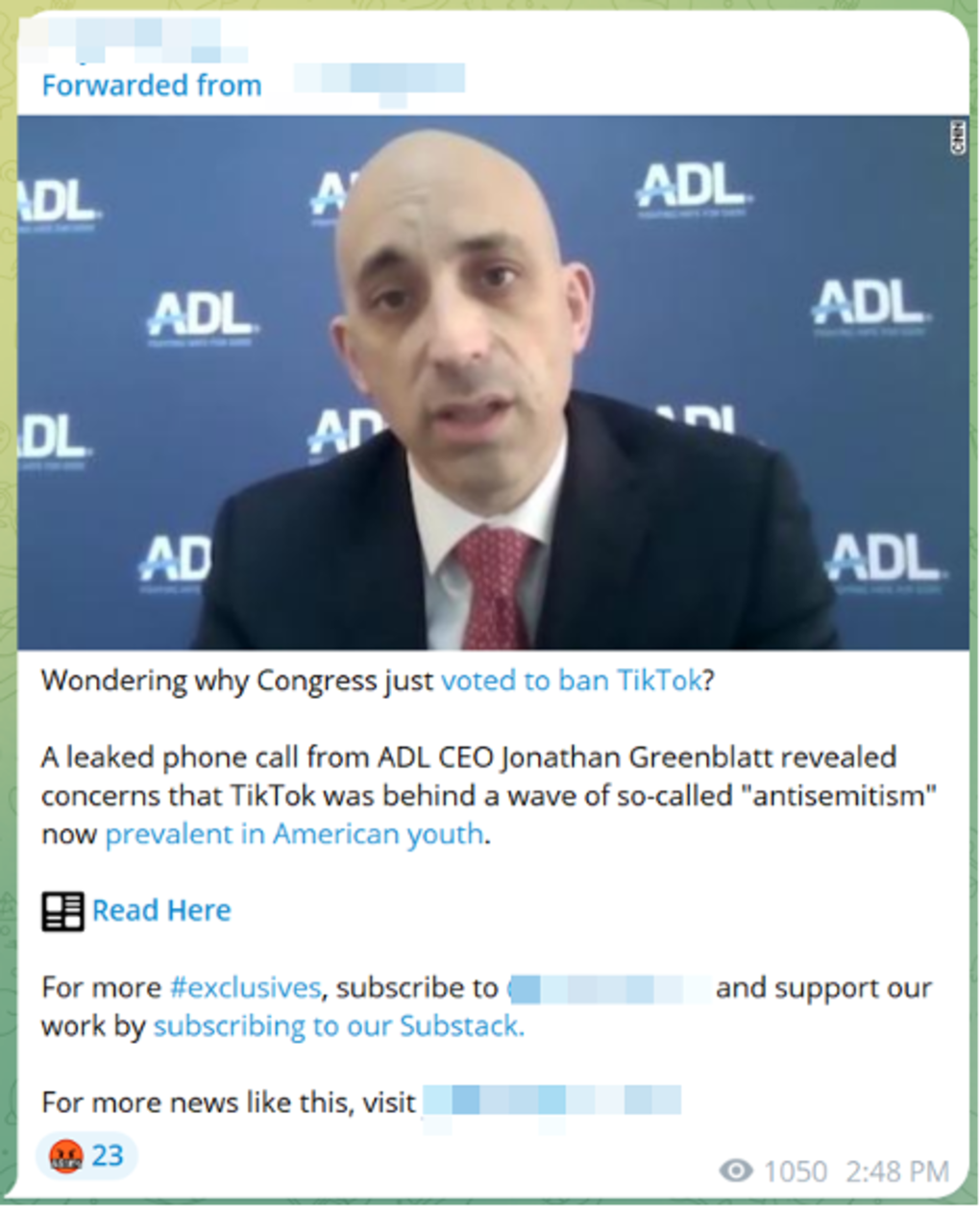
Forwarded message in GDL channel shares false claim about ADL. Source: Telegram
Notably, ADL regularly points out gaps in content moderation practices on social media platforms, including but not limited to TikTok, and works to provide insight and recommendations on how to address them. In a March 13 statement, ADL encouraged legislation and action to help curb hate on TikTok and called for the platform to allow more accessibility to researchers.
Greenblatt has also publicly acknowledged the significance of TikTok as a news outlet for young people on social media, urging the platform’s owners and stakeholders to “take action” in making meaningful improvements. These calls-to-action have not included an outright ban of the platform.










